Filter by
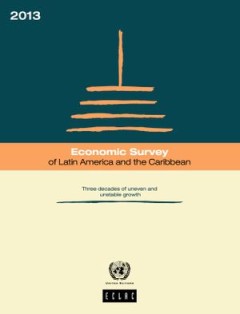
Economic Survey of Latin America and the Caribbean 2013 : Three decades of un…
The sixty-fifth edition of Economic Survey of Latin America and the Caribbean covers the two-year period 2012 2013. As in previous editions, the first part examines the recent performance of the economies of the region and the outlook for the current year. The second part discusses long-term aspects of the economic development of Latin America and the Caribbean. Country notes, which look at the…
- Edition
- -
- ISBN/ISSN
- 9789211218336
- Collation
- -
- Series Title
- -
- Call Number
- 650
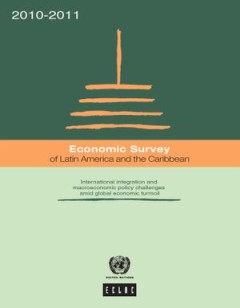
Economic Survey of Latin America and the Caribbean 2010-2011
After contracting in 2009, GDP expanded by 5.9% in Latin America and the Caribbean in 2010, albeit with the region's hallmark differences in performance from one country to another. The expansion in output was driven by strong domestic demand in the forms of both consumption and investment, and by buoyant external demand. On the domestic demand side, private consumption (up 5.9%) was sustained …
- Edition
- -
- ISBN/ISSN
- 9789211217650
- Collation
- -
- Series Title
- -
- Call Number
- 650
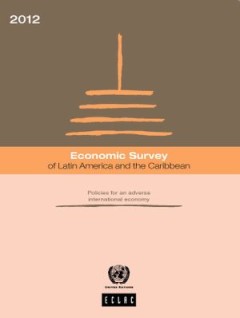
Economic survey of Latin America and the Caribbean 2012 : Policies for an adv…
The sixty-fourth edition of the Economic Survey is divided into four chapters. The first chapter reviews the economic performance of Latin America and the Caribbean during the first half of 2012, against the backdrop of a global economic slowdown and heightened uncertainty as to prospects for growth in the major economies. This scenario contributed to a slight cooling of economic expansion in L…
- Edition
- -
- ISBN/ISSN
- 9789212210711
- Collation
- -
- Series Title
- -
- Call Number
- 650
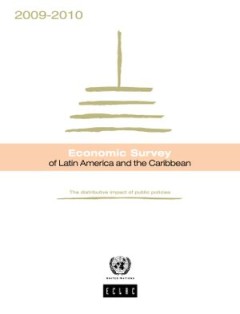
Economic Survey of Latin America and the Caribbean 2009-2010 : The distributi…
In 2009, the economies of Latin America and the Caribbean suffered the onslaught of the global financial crisis and, as a result, the region's GDP shrank by 1.9%. In the second half of the year, however, most of the region's countries were experiencing a robust recovery that has been consolidated in 2010, paving the way for regional GDP to expand by 5.2%. This makes Latin America and the Caribb…
- Edition
- -
- ISBN/ISSN
- 9789211217414
- Collation
- -
- Series Title
- -
- Call Number
- 650
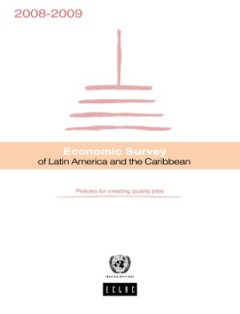
Economic Survey of Latin America and the Caribbean 2008-2009 : Policies for c…
The publication of the sixty-first edition of the Economic Survey of Latin America and the Caribbean, corresponding to 2008-2009, comes at a critical point in the economic development of the Latin American and Caribbean region. A growth phase that the region's recent history cannot equal in nature and duration has come to an end and output is contracting. The toll this state of affairs is takin…
- Edition
- -
- ISBN/ISSN
- 9789211217117
- Collation
- -
- Series Title
- -
- Call Number
- 650
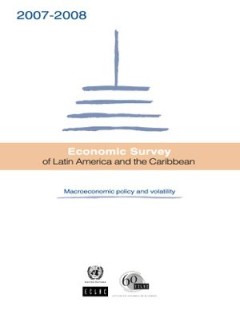
Economic Survey of Latin America and the Caribbean 2007-2008
This 2007-2008 edition of the Economic Survey of Latin America and the Caribbean comes 60 years after the first session of ECLAC, when the Executive Secretary of the Commission was mandated by the United Nations Economic and Social Council and the countries attending the session to undertake "the collection, evaluation and dissemination of [...] economic, technological and statistical informati…
- Edition
- -
- ISBN/ISSN
- 9789211216776
- Collation
- -
- Series Title
- -
- Call Number
- 650

Hidden Attractions of Administration : The Peculiar Appeal of Meetings and …
This book argues that the expansion of administrative activities in today’s working life is driven not only by pressure from above, but also from below. The authors examine the inner dynamics of people-processing organizations—those formally working for clients, patients, or students—to uncover the hidden attractions of doing administrative work, despite all the complaints and laments abo…
- Edition
- -
- ISBN/ISSN
- 978-1-003-10843-6
- Collation
- -
- Series Title
- -
- Call Number
- 650 AKE h

Statistical Yearbook of Latin America and the Caribbean 2010
- Edition
- -
- ISBN/ISSN
- 9789210210737
- Collation
- -
- Series Title
- -
- Call Number
- 650
- Edition
- -
- ISBN/ISSN
- 9789210210737
- Collation
- -
- Series Title
- -
- Call Number
- 650
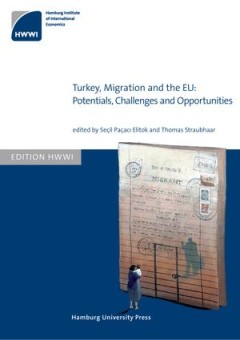
Turkey, Migration and The Eu : Potentials, Challenges and Opportunities
In the context of Turkey's accession to the EU, the issue of potential migration from Turkey and its impact upon European labor markets became one of the concerns of the EU, considering Turkey's growing population and young labor force. In 2011, half a century after the bi-lateral agreement between Turkey and Germany on labor recruitment in 1961, migration plays a key role in relations of Turke…
- Edition
- -
- ISBN/ISSN
- -
- Collation
- -
- Series Title
- -
- Call Number
- 650

Sportfinanzierung - Spannungen zwischen Markt und Staat
On the one hand, sport like any other activity in society is burdened with public taxes, and on the other hand, in comparison to similar activities, is tax-free and even publicly supported. This ambivalence of tax treatment of sport has repeatedly raised questions about the public financing of sport: To what extent are services provided by the public sector justified, and to what extent do spor…
- Edition
- -
- ISBN/ISSN
- 9783937816531
- Collation
- -
- Series Title
- -
- Call Number
- 650
 Computer Science, Information & General Works
Computer Science, Information & General Works  Philosophy & Psychology
Philosophy & Psychology  Religion
Religion  Social Sciences
Social Sciences  Language
Language  Pure Science
Pure Science  Applied Sciences
Applied Sciences  Art & Recreation
Art & Recreation  Literature
Literature  History & Geography
History & Geography